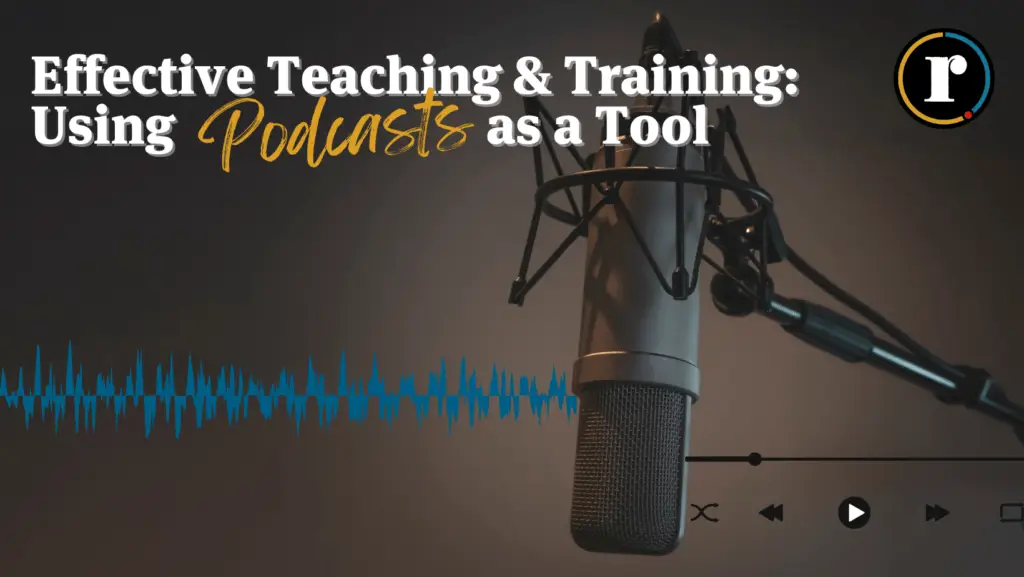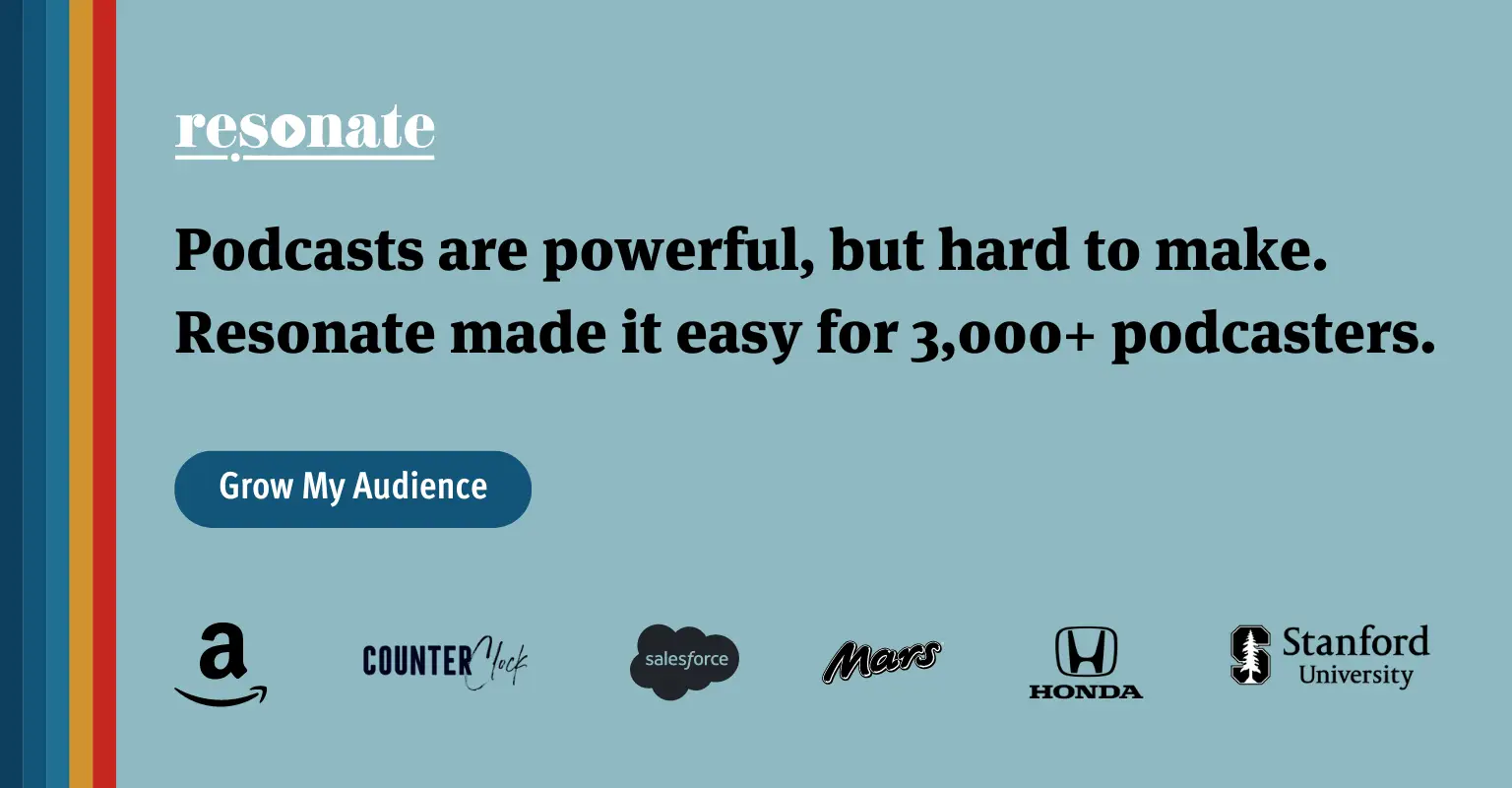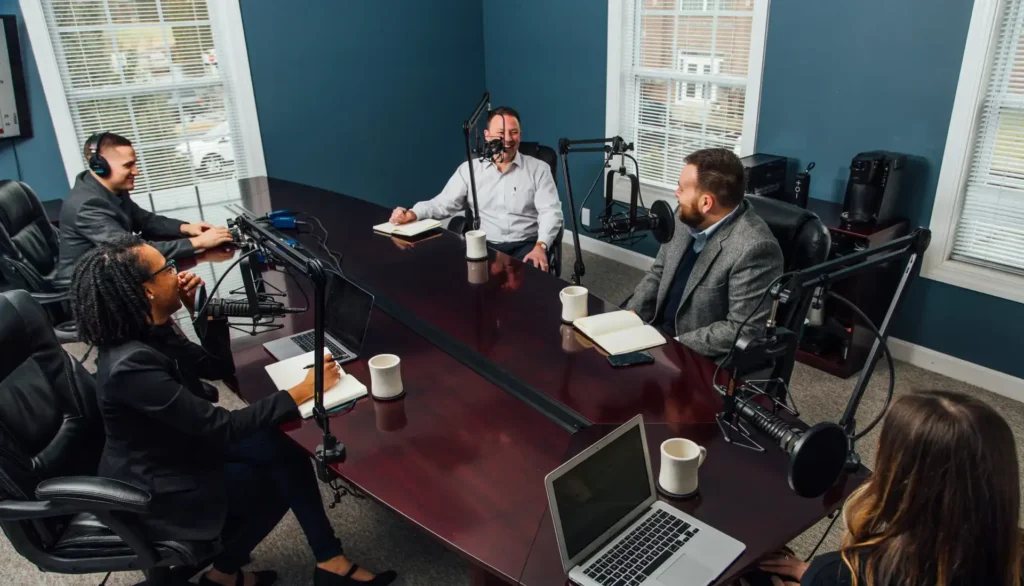Have you ever considered the power of sound in corporate training or in the classroom? Picture this: a room full of eager employees or students, eyes closed, headphones on, their minds painting vivid images from words they hear. That’s the magic that podcasts can bring into your business or school.
Not only are they cost-effective and easy to integrate into learning but also serve as an excellent tool for training employees beyond manuals and PowerPoint presentations, and teaching students beyond textbooks.
In today’s tech-savvy world where people often prefer earbuds over books, how can businesses and educators effectively use podcasts as a training or teaching tool?
This is no ordinary question; it opens doors to innovative learning experiences tailored for digital natives – encouraging active listening skills, providing diverse narratives, and enabling anytime-anywhere learning. And guess what? The answers may just revolutionize your training methods!
The Power of Podcasts in Enhancing Literacy Skills
Podcasts are more than just an entertaining pastime; they’re a powerful tool for building literacy skills. They can help students gain confidence, improve their listening comprehension, and enhance word recognition.
Boosting Pronunciation and Prosody through Podcasts
In the realm of language arts, podcasts have proven to be especially useful. For English-language learners, regularly tuning into a podcast episode can aid pronunciation by providing examples of how words sound in natural speech. More so, it allows them to pick up on prosody – the rhythm and pattern of sounds in speech – which is crucial for understanding native speakers.
By offering this practical experience with spoken language that textbooks often lack, podcasts effectively engage students while enhancing their literacy skills. Word recognition, for instance, improves as listeners become familiar with phrases used frequently within episodes. Similarly, listening comprehension blossoms when young minds listen to articulate presenters expressing complex ideas.
Apart from these benefits at an individual level:
- a culture of active learning
- a deeper connection between educators and students
- a vibrant classroom environment where curiosity thrives
These factors are also fostered as teachers weave relevant educational podcasts into lesson plans or encourage group discussions around interesting podcast episodes.
All these experiences combined not only make learning fun but empower each student to develop lifelong learning habits outside traditional classroom materials.
Note: This does not suggest tossing out books entirely. Rather let’s use technology like mobile devices to access content that supplements and enriches what students learn from books.
Now, imagine a classroom where podcasts aren’t just an additional learning tool but the main event. That’s right. It’s time we let students create their own podcast episodes as part of project-based learning. Exciting times ahead.
Expanding Knowledge Horizons with Diverse Podcast Narratives
Podcasts are an amazing tool for educators to expand their students’ knowledge horizons. They offer a wide range of narrative types and subject matter, providing ample opportunities for classroom learning.
A staggering 500,000 active podcasts cover virtually every topic imaginable. This allows teachers to bring diverse perspectives into the classroom and spark interesting discussions among students.
Using Fictional Stories for Engaging Learning Experiences
Fictional stories from podcasts can be particularly engaging as they allow students to immerse themselves in different cultures, time periods, or situations. They’re not just listening; they become part of the story. As English language learners engage more deeply with these narratives, they naturally improve their vocabulary and comprehension skills.
The beauty of fictional podcast episodes is that they make abstract concepts tangible by weaving them into compelling tales – something textbooks often fail at. So, whether it’s science fiction introducing quantum physics or historical dramas bringing past events to life – educational podcasts prove effective in keeping pupils hooked onto subjects traditionally considered dull or hard-to-grasp.
In fact, great educational podcasts like Tumble Science have been designed specifically for young audiences.

Using Podcasts For Training In The Professional Environment
Companies can benefit from podcasts for the training and development of their staff because the format is adaptable and simple to use. The adaptability of podcasts is a major selling point for their use in education and training. Employees can listen to podcast episodes whenever it’s most convenient for them, including on the way to and from work, while working out, and during downtime. This on-demand availability frees workers from time-based restraints and paves the way for ongoing learning at the worker’s own pace.
Podcasts are also adaptable to different ways of learning. Podcast episodes can benefit from the addition of visual aids and interactive components to increase comprehension and participation. Podcasts are also flexible in that they may be tailored to the knowledge level of the listener, making them useful for both new hires and seasoned workers. Businesses can ensure their employees always have access to the information they need by creating a podcast library of training materials.
Moreover, podcasts can encourage teamwork and camaraderie among employees. Best practices, success stories, and ideas from experienced staff or industry experts can all be shared on such a platform. Businesses can foster a culture of knowledge sharing and peer mentoring by providing opportunities for employees to share their expertise through podcasts or other forms of collaborative learning. This not only improves the quality of the training itself, but also the company’s culture and employee involvement, which in turn produces a more competent and enthusiastic workforce.
Harnessing the Flexibility of Podcasts for Anytime Learning
Podcasts provide remarkable flexibility that can transform learning experiences. Imagine students tuning into an educational podcast during their morning bus ride or absorbing a history lesson while doing chores at home.
This level of accessibility means learning isn’t confined to classroom time anymore. Students can now study in the manner that suits them best and, in an atmosphere where they experience the most ease.
Studies show that this kind of stress-free environment might be just what students need – two thirds of 15 – 16-year-olds report feeling stressed about poor grades.
The Benefits Beyond Accessibility
The anytime-learning model doesn’t just offer flexibility; it also aids information retention by allowing multiple listenings without additional pressure on teachers’ schedules.
In essence, podcasts act like personal tutors sitting inside mobile devices. With every replay, difficult concepts become more familiar and easier to understand.
Making Learning A Part Of Daily Life
When you integrate podcasts into daily routines, training becomes less rigid and formalized – much like language arts woven into our everyday conversations.
Beyond traditional subject matter exploration, students get exposed to real-world contexts which enrich their overall understanding – something textbooks often struggle with.
Note: You don’t always need high-tech gadgets for great results. Even budget-friendly smartphones or tablets can do the job perfectly well.
Coupling podcast listening with regular discussions not only encourages active participation but also helps teachers gauge students’ understanding on the go. So, it’s time we leverage this powerful learning tool that sits right at our fingertips.
The Role of Podcasts in Active Learning and Revision
Podcasts have found a sweet spot in the realm of active learning, serving as an effective revision tool. When students listen to podcasts, they engage with content more deeply than when reading or watching.
Podcasts for Better Information Retention
Information retention is one area where podcasts shine. Spaced repetition, a technique often used in podcast episodes, helps embed information into long-term memory by reviewing it at increasing intervals.
This method can make sure that even complex topics stick with students longer than traditional teaching methods might allow. Imagine trying to learn about Shakespeare’s works from a textbook versus hearing Ian McKellen discuss them on a podcast – which do you think would be more memorable?
A great example comes from high school English teachers using educational podcasts like ‘Revise – A Level English Lit Revision‘. This resource offers deep dives into various literary topics, helping language arts learners get grips with tricky subjects outside classroom time.
In this context, students are not just passive listeners but also active participants who ask questions and offer their own insights during follow-up discussions after each episode – making learning truly interactive and fun.
Creating Original Content with Podcasts
Who knew that giving students a voice could be as easy as pressing record? That’s right. Encouraging your students to create their own podcasts can help transform the learning process. And guess what, it’s cost-effective and simple.
Encouraging Students to Make Their Own Podcasts
We’re not talking about setting up an elaborate recording studio here. In fact, creating a podcast requires minimal equipment – just a good microphone and some basic editing software will do the trick. This simplicity lets young learners dive into content creation without feeling overwhelmed by technical complexities.
At Resonate Recordings, we only work with the most outstanding podcasters, and we’re convinced that great podcasts can be found anywhere, including in classrooms. Contact us right away if you believe your school has produced exceptional podcasts that might benefit from our expert sound editing, mixing, and mastering services. We know that turning humdrum podcasts into elaborate productions boosts their overall attractiveness, which in turn attracts more listeners and keeps them coming back for more.
If you foster an environment where students feel safe to try new things and express their creativity, you may find that some of their podcasts really stand out and have what it takes to reach a broader audience. Use the power of Resonate Recordings and our experienced staff to bring out the best in your school’s podcasting endeavors.
A podcasting project gives students an opportunity to express themselves in ways traditional classroom methods may limit. It opens doors for creativity, critical thinking, and effective communication – skills they’ll carry far beyond high school.
Beyond these benefits though is something even more impactful: empowerment. By making their own podcasts, students become active contributors rather than passive consumers of information. This role reversal not only boosts engagement but also fosters ownership over one’s education – now that’s real learning.
The best part? They don’t need hours on end in front of computers or fancy gadgets lying around at home (goodbye budget constraints.). All you need is some quiet space and mobile devices; yes, those pocket-sized powerhouses are all you require.
Making educational content has never been this accessible before thanks to technological advancements like user-friendly apps designed specifically for podcast creation – another reason we love them so much.
In short: Start letting your kids create podcasts today because who knows…they might turn out to be the next big thing in the podcasting world.
Types of Podcasts Companies Can Use To Train Their Staff
Podcasts for employee training allow businesses to address a wide range of issues pertinent to their staff and help them achieve their organizational objectives. When developing podcasts for employee training, businesses should focus on the following areas:
- Skills Development: Podcasts can be a useful tool for training and education purposes. Businesses can create episodes that teach employees new skills and provide them with guides on how to perform specific tasks. A software development firm, for instance, may provide podcasts about efficient methods of coding and project management, as well as the most recent developments in software. Listening to these podcasts can help workers keep up with developments in their fields and develop their technical skills.
- Personal Growth and Soft Skills: Training podcasts are a great way for businesses to impart knowledge in a variety of areas, not just technical ones. Employees can be motivated to do their best and contribute to a pleasant work environment by learning about topics such as effective communication, time management, leadership skills, and emotional intelligence. Listening to these podcasts can help workers improve their skills and move up the corporate ladder.
- Company Culture and Values: Training podcasts can also be important in reiterating an organization’s core principles and beliefs. The goals, values, and vision of a company might be the subject of a podcast. The sharing of success stories, teamwork, and company milestones can help employees feel more connected to the company’s mission and values. This not only helps employees learn more about the organization’s history and values, but it also helps them feel more personally invested in the success of the business.
Training podcasts that cover a wide variety of subjects provide employees with a more holistic education that benefits individuals and the business.
Using Existing Podcasts for Diverse Subject Matter
Educational talks, current events, history, and sports-related podcasts are great resources that can be effectively used in classrooms. By tapping into the wide variety of subject matter available through podcasts, educators can create a more engaging learning experience.
For instance, About Race provides deep insights into racial issues – an excellent tool for social studies or language arts discussions. Similarly, students might listen to Stuff You Should Know to explore everything from science topics to historical events.
The power of existing podcasts lies in their diversity, offering a broad array of narrative types and subject matters which cater to different learning styles and interests. It’s like having a mobile device full of knowledgeable guest speakers on hand.
Incorporating these resources not only enriches classroom time but also encourages student engagement as they discover new interests outside the textbook curriculum. But remember – selecting suitable content requires some groundwork: A quick Google search is often enough to find age-appropriate material relevant to your lesson plan.
A Few Great Educational Podcasts To Get Started:
- Tumble Science: This podcast helps younger students understand scientific concepts with fun stories and creative explanations.
- New York Times’ The Daily: High schoolers get informed about world affairs while improving their listening skills; good luck trying not to hear them discuss current events after this.
- The Infinite Monkey Cage: This BBC Radio 4 show delves into fascinating science questions – it’s a surefire way to keep older students engaged.
So, start exploring the world of podcasts today. It’s time to let these audio gems spark a love for learning in your students.
Conclusion
In conclusion, podcasts have become an increasingly important resource in today’s classrooms, providing opportunities for both teachers and students to expand their horizons in terms of knowledge, interest, and originality. Podcasts may be used in a wide variety of contexts to improve students’ learning experiences, demonstrating their flexibility, accessibility, and adaptability. Podcasts can develop a stronger connection to course content and an interactive learning environment, whether they are used to complement conventional classes, stimulate conversations, or give a platform for students to voice their own views.
Keeping up with the rapidly evolving field of education necessitates an openness to novel methods, such as podcasting. Teachers may better meet the requirements of their pupils in the digital era by embracing this medium and tapping into its possibilities. For the sake of present and future generations of students, let’s grab the chance to use podcasts to their full potential and further modernize traditional classroom instruction.












